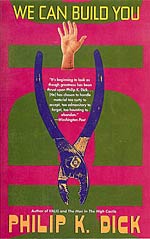
![]() charlesdee
charlesdee
2/12/2013
![]()
PKD always said that he wrote with his fingers. For a decade or so he wrote with his fingers on speed. He would get an outline together, then sit himself at the typewriter and let it flow. He wrote this novel in 1962, his annus mirabilis during which he completed 12 novels. This is the most "stream of conscious" novel of his that I have read. Not in the sense that he is creating characters who share their interior monologues. The interior monologue is all Phil's, partially put into the mind of his first person narrator, but mostly spilling out in a direct current from his brain to his fingers to the page.
We Can Build You takes place in the distant future of the 1980's. (PKD seldom bothered setting stories far enough into the future that any of the scientific marvels he works into his plots might be even vaguely possible.) Louis Rosen works for Maury Rock in a shady sales business. They run ads in small-town newspapers announcing the local repossession of a piano or electronic organ, and they are ready to make a deal if it saves shipping. They do pretty well, having survived one Better Business Bureau investigation, but business is drying up. Maury and his engineer have decided instead to go into the simulacra business, creating human simulacra so lifelike they easily pass as the real McCoy, or in this case the real Edwin M. Stanton, Abraham Lincoln's Secretary of State. They have Lincoln himself in the works.
One quarter of the American population is schizophrenic and spends time in government-run facilities. A small number of citizens are radiation mutants -- Louis's younger brother has his face upside down on his head. Thomas C. Barrow is an entrepreneur who needs to unload some lunar real estate. Pris is a beautiful, recovering schizophrenic and Maury's daughter. Louis's love of Pris is driving him insane.
That's about it. Scene after scene is outrageous but seldom very funny. Perhaps because the narrator is so driven, there is never any distance from the action. Take a scene where Louis is getting legal advice from Abraham Lincoln in a San Francisco nightclub while Earl Grant performs onstage. That's funny when you think about it.
I can imagine some French critic has described We Can Build You as a meditation on what it means to be human, which I suppose it is. But I have a different idea. Think of it as a ride on a roller coaster that consists of nothing but that first, breathtaking plunge.
http://www.potatoweather.blogspot.com